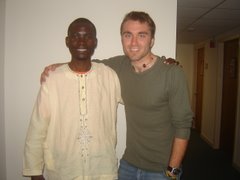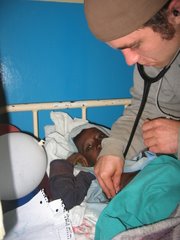Monday 8 Jan, 2007 – 08:56 Kigali
It was a beautiful day at 6 this morning when my alarm clock got me out of bed. The sun had just started to share its rays, the birds sing their songs, and the preacher man next-door scream about heaven and hell like there was no tomorrow. We get that a lot in Kimihurura, my neighborhood, living next to the Pentecostal church. It was a big day for me, a 22 year old near-adult, getting ready for his first day of medical school... as a lecturer. In two hours’ time I was to stand in front of 47 second-year students and introduce them to their course in Medical Laboratory Technology. But before we get there, let’s back up a bit and talk about the formation of this nebulous internship.
Two years ago I met a Rwandese physician named Maria Kabanyana at an HIV/AIDS conference in Iowa City. Over the course of a few days we became friends, talking about AIDS, genocide and a few of the world’s other plagues over coffee at a downtown shop. We kept in distant communication via email, often with long gaps in between messages. I’m not sure if it was first my proposition or her invitation, but somewhere along the line we began discussing the possibility that I’d visit Rwanda, getting a first hand experience of its health care system.
She put me in touch with an administrator at the Kigali Health Institute (KHI), to whom I sent my resume and request for an internship. A couple of emails later everything was confirmed, sort of. I had received notice that I’d be interning in the department of “Med. Lab. Tech.”, which I took to mean medical laboratory technician. Given my experiences as an EMT on an ambulance, working in the ER, and spending the past summer as a health care provider in a northern Kenyan bush hospital, I assumed the internship would entail something in clinical medicine.
However, two weeks before departing from the US, it occurred to me that I did not really know the details of my internship. Upon enquiring as to what precisely it would entail, I received the following message:
"Benjamin, courses here will commence 8th January. At the moment we are about to start the year plan but will be coming to you shortly, probably on monday. At the moment however, Is there any subject in medical sciences you would like to teach?"
What? Teach? I am merely a student on furlough, hoping to be admitted into medical school myself, not teaching it. But then this realization: with genocide came the collapse of a health care system. Doctors and students alike either sought refuge or were murdered. And of those who fled, few will likely return to this nightmarish land. Rwanda is now proactively trying to rebuild its health sector, with focus put on training nurses, paramedics, and medical students. And so yes, teaching. After all, I do have a degree from a reputable institution and thus license enough to share what I’ve learned with students who have not had the same opportunity. After a flurry of exchanges and conflicting details from multiple sources, I decided to just show up, figuring it would all make sense once I arrived.
As it turns out, “tech.” actually stood for technologies as in “medical laboratory technologies” and not technician, as I had incorrectly presumed. Furthermore, KHI, I learned, was actually a university and not a teaching hospital. Hence, what they keyed in on was not work experience but the Biomedical Engineering degree under my belt.
Last Thursday the Med Lab Tech professor and I got together to discuss my stay at KHI; he had not yet planned out the semester, but thought it appropriate that I begin on day one, teaching a lecture on Lab Safety. Then in a few weeks I’ll travel around the country facilitating the curriculum’s phlebotomy education at branch campuses, which involves lecturing, demonstrating, teaching, and supervising during their in-hospital rotations.
I also have a joint-appointment in the department of Medical Imaging, where I’ll be teaching the physics of Ultra Sound, X-ray, and CT (I made sure to wiggle my way out of MRI because of its dauntingly complex physics). This will likely take the majority of my time, studying by night and lecturing by day – seven hours, five days a week. Fortunately they use the same textbook as I studied from during my master’s level course. Unfortunately they only have one book to share between myself, the other instructor, and about 45 students.
So back to today – the educational system in Rwanda. After a small breakfast (peanut butter and jelly on a bread roll – peanut butter costing $4 a jar but, for me, absolutely worth it), I took tea, sent emails, and headed out the door. The first matatu (translation: twenty people crammed into a microbus, calling itself a taxi) took me downtown. The next one far away from where I needed to be (the chauffer, taking advantage of my ignorance, told me he was going one way, took my money, and went the other). Frustrated, I hopped off, said my prayers, and took a motorcycle-taxi to campus (my first time on a motorcycle since working in the hospital three years ago, where I saw my fair share of paralyzed cyclists).
I made it to the empty classroom just in time for my 8 o’clock lecture. “But where are the students,” I asked Roman, the paid professor. He assured me they’d trickle in. And then the most peculiar thing happened. Seeing that I was in the right place at the right time and ready to teach, he wished me luck and shuffled back to his office – and never came back.
I had 2 students by quarter after, 5 by 8:25, then back down to 3 at half past eight. Janitors came ten minutes later to pour buckets of soapy water on the floor, a perfunctory cleansing of an already clean floor. Apparently the first day class is a casual one and, for laboratory students, optional at best. Most of the class, said the ones who were present, were looking for housing and attending to other needs, and probably would not show. This is cultural difference I find difficult to understand, as I would have arrived last Friday to take care of these things ahead over the weekend. But so it goes – just because it is not the way I’d choose to arrange life does not mean it is wrong. So after an impromptu lesson in Ultra Sound physics (the only other subject I had been reading up on) I dismissed the small but diligent crowd for the day.
And so I roll with it – but hopefully tomorrow I’m rolling with a full class. At least now I’m on the verge of teaching, and can face the street people knowing I am doing something – helping to rebuild a health care system that can address their needs.
In the mean time, back to the books…
Monday, January 8, 2007
Subscribe to:
Post Comments (Atom)



3 comments:
Upright MRI info. http://tinyurl.com/9s5hu
As a teacher myself, I can relate to your desire to have a lesson plan, and to know exactly what you will be teaching. I know for me, I would be going crazy if it was a few days before class, and I still didn't really know what I was expected to cover or how many students to plan for. So, Ben, I bless your flexibility! I think it is amazing how optimistic you are right now. You are an encouragement to me. Keep it up!
I second jeremy's observation on your optimism. Let it carry you. Please be naive. Let the work of your hands be the joy of your heart. Teacher man.
Post a Comment